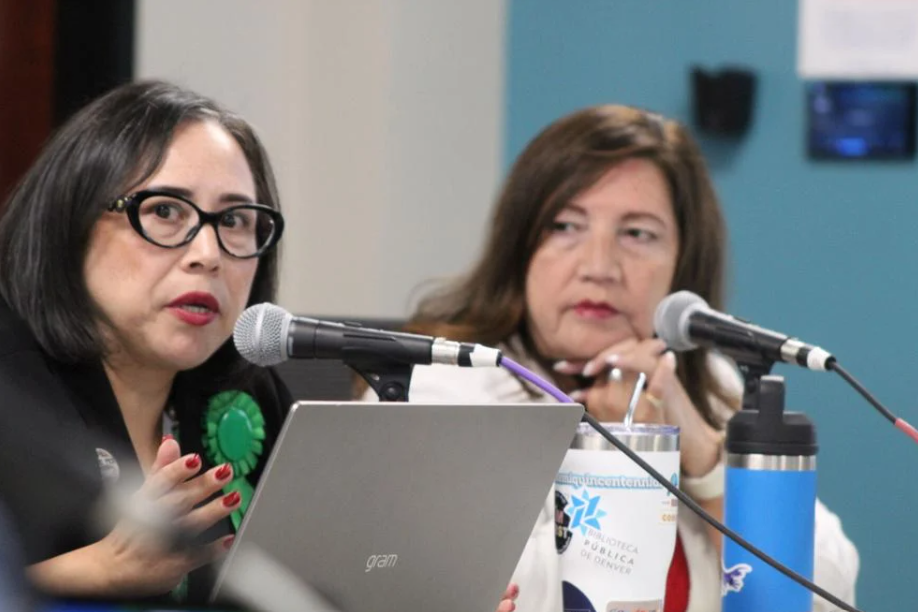Pikes Peak-region school district board member removed, ruled ineligible for reelection

After a 2½-year stint of bitter infighting, calls for resignation and voting against the grain, Ivy Liu is no longer a School District 49 board member.
D-49’s legal counsel cited her recent move outside of her director district as reason for her ouster and said she is ineligible for reelection because her candidate petition failed to receive enough valid supporting signatures to make the ballot.
Liu moved houses in August to retain eligibility in November’s school board election after the lines of her director district were changed last spring. Those boundary changes will not take effect until after the election, meaning that although her move would have allowed her to seek reelection with proper signature support, she is no longer eligible to serve out the remainder of her term. Board members must at all times reside within the districts they represent.
“Although it is sort of complicated, bottom line is this is about maps and math, and maps and math are not really subjective,” Superintendent Peter Hilts said. “The map is, do you or do you not live in the area that you aspire to represent? The math is, did you or did you not get the required number of signatures?”
Investigation of District 49 board member complete; redistricting is the next hurdle
D-49 legal counsel Brad Miller said Liu failed to receive 50 valid signatures supporting her candidacy, the minimum amount required to run for election. Documents Liu shared with The Gazette show more than 60 people signed her petition, including several people she said were from outside her district. As a result, she claims she had 54 valid signatures.
Miller, whom Liu has publicly criticized and who in November launched an investigation into her conduct, said Liu only received 46 valid signatures. Although he “did not have anything to do with the verification process” – a responsibility reserved for a trained and certified district election officer – it is possible several more signatures were invalidated because the signers did not reside within the correct director district, he said. Liu refutes these claims.
As of Thursday, Liu’s position was listed as vacant on the D-49 website. Liu told The Gazette she has not yet been notified about her removal nor told she was disqualified from running for reelection after filing her candidate petition last week.
“He will keep coming at you until he gets you, and he thinks he’s succeeded, but I’m not done with it,” Liu said of Miller.
Liu’s school board tenure includes alleged attempts at strong-arming her from her position, she said. She twice endured public censures for her conduct, which the board said violated district policy.
District 49 announces investigation into censured board member
Tensions notably came to a head at a Nov. 10 meeting when a 3-2 board majority passed a resolution asking Liu to resign. Liu had earlier that month come under fire for quoting Hitler on Facebook in what she said was an attempt to point out “toxic ideologies” and indoctrination infiltrating America’s education system.
She said she helped spearhead the district’s moves to ban critical race theory and end its mask mandate. She also regularly challenged the district’s approach to improving academic performance, which she says garnered her “many enemies right away.”
“They’ve been trying to get rid of me,” Liu said. “They are thinking this might be it with the election, but they don’t know who they’re dealing with. I’m going to do everything I can to fight this.”
Voters in D-49 chose in 2015 to transition away from an at-large model, in which all board members represent the district as a whole, to a director district model, in which each board member is elected to represent one of five areas within D-49. Board members must live in the area they represent, and per statute, director districts must be nearly equal in population size.
D-49 again bans ‘critical race theory’ amid bitter infighting on school board
Growth has since dramatically changed D-49’s layout. Boundaries that in 2015 saw 3.2% variance between director district population sizes had more than 43% by 2023. The board voted 4-1 this spring to redraw its director district boundaries to better comply with statute, thereby writing Liu out of her district in a move she characterized as dishonest gerrymandering.
“They’re counting on the fact that if they just wear you down … they want to take out the enemies, and I’m just not going to let them,” Liu said. “This is it. This is their last resort.”
Liu searched for ways to retain her board position despite the new boundaries.
Experts say there is a gray area in state law regarding a school board candidate’s residency requirements. Whereas state Legislature candidates must live in their districts a year before election, law is less specific for school board elections.
Hitler quoted by Colorado Springs-area school board member, board says hands are tied
On Aug. 24 Rachel Amspoker, a staff attorney with the Colorado Association of School Boards, told Liu in an email obtained by The Gazette that “the statute is unclear whether you need to be a resident of the director district at the time of the election or the time you file the petition” and said it would be “safer” to reside in her director district’s new boundaries at the time she files her candidate petition, which had a deadline of Sept. 1. Amspoker sought additional clarity from the Colorado Secretary of State’s Office.
“My interpretation of that statute has been that it is something required of the candidate on the day they are elected. I have based this conclusion on the fact that the statute does not set a time-limit of any kind on how long the candidate must have been at the residence to qualify,” Caleb Thornton, the legal, policy and rulemaking manager for the Secretary of State’s Office, wrote in an email to Amspoker.
Interpretations from CASB and the Secretary of State’s Office suggest Liu would be eligible for election as long as she moved by Election Day. Liu said she moved on Aug. 25 out of an abundance of caution, but district officials still challenged the legitimacy of her candidacy.
Miller said his legal opinion is that Liu would be ineligible for election based on residency requirements, but that matter is “irrelevant” because she did not receive enough signatures in her support.
“That’s a black and white line,” Miller said.
The confusion surrounding Liu’s candidacy is “unprecedented” because most school districts do not follow director district models, and candidates rarely go to such lengths for elections, according to Hilts. As such, D-49 is navigating uncharted territory and facing new residency questions.
“It’s very unusual for a person to try to change their residency for the purpose of establishing a candidacy, so there’s not a lot of precedent, and we had to rely on plain language interpretation and guidance from others,” Hilts said. “Once you know any one of the requirements are missing, then the other ones become either irrelevant or moot.”
Before the district reached a final ruling on whether Liu met residency requirements, it found she lacked enough valid signatures.
Headed into November, three of five school board seats will be up for grabs. District two has two verified candidates, district three has three verified candidates and Liu’s director district, district five, has one verified candidate. Liu is not among them, but her campaign partners Deb Schmidt and Mark Cravens are seeking election to director districts two and three, respectively. She intends to support their campaigns.
“In a season when accusations fly and are easy, it’s more important than ever to trust and verify proven processes. That’s why I have such confidence in our county clerk and recorder and in our elected official because they’re trained, they’re certified, and we trust them with reason to do a great job,” Hilts said.










